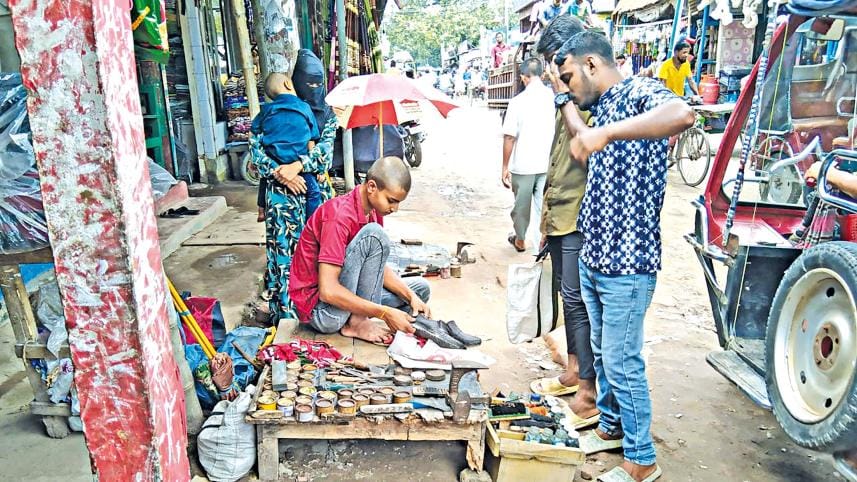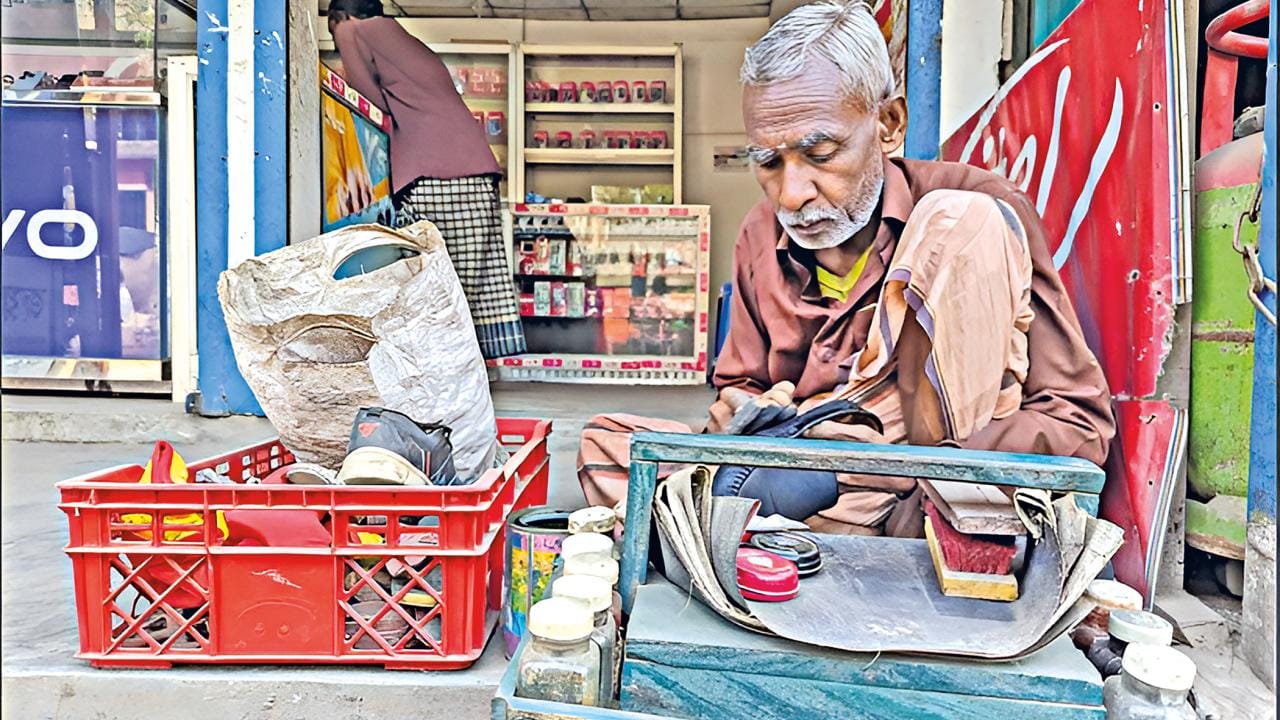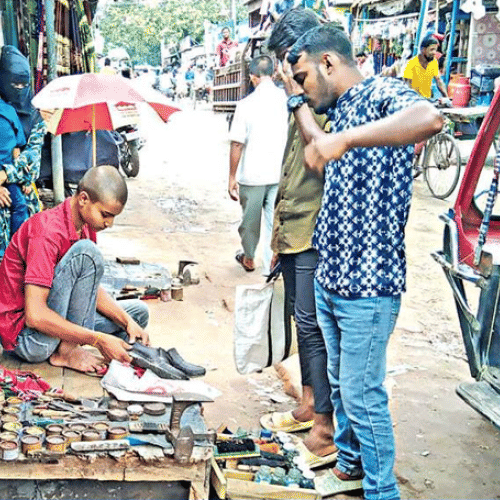The weight of untouchability: Rabidas community in Bangladesh

In the markets of North Bengal, the Rabidas community has long endured prejudice, their cobbler's tools passed from one generation to the next. But when 14-year-old Joy Rabidas was forced to trade his school uniform for his father's tools after a brutal mob killed Ruplal Rabidas, the cruelty of that inheritance became stark. His story is not just about one boy's lost childhood; it mirrors the systemic neglect towards a community defined by untouchability, social exclusion, occupational stigma, and limited access to land, education, and political power — shackling them to the margins of society.
Scattered with fading roots
The Rabidas community traces its lineage to the Chamar caste, historically associated with leatherwork. Though spiritually linked to the teachings of the 15th-century saint Guru Ravidas, who preached equality and inner purity, the community has long borne the stigma of being "untouchable" due to their profession.
The community has a distinct ethnic identity with its own language, culture, beliefs, social system, and even puthi literature. Yet in Bangladesh, they often go unrecognised due to the lack of caste-specific data. Over the years, poverty, lack of education, and insufficient support have eroded their identity. Unable to compete with dominant mainstream culture, they are increasingly discouraged from practising their traditions, pushing a rich ethnic identity towards extinction.

Their ancestral homeland is believed to lie in undivided Bengal, Bihar, and parts of Odisha. During British rule, many migrated here for work, gradually settling across different districts, villages, and even tea gardens. Unlike other backward communities, clustering in a specific area would pose a major obstacle to their livelihoods, compelling them to live in dispersed settlements. The largest concentration of the community is in Naogaon's Niamotpur thana, making it home to the highest population. Other districts with significant Rabidas communities include Bogura, Gaibandha, and Habiganj.
"We have around eight lakh Rabidas in Bangladesh, spread across almost every district and upazila," said Shipon Kumar Rabidas, General Secretary of the Bangladesh Dalit and Excluded Rights Movement (BDERM) and Founding Secretary of the Bangladesh Rabidas Forum. "Our scattered settlements are necessary for our work. But this also means we are invisible, fragmented, and left behind."
Stubborn face of discrimination
In North Bengal, where the Rabidas are heavily concentrated, the weight of caste remains crushing. Areas like Sundarganj in Gaibandha, Nageshwari in Kurigram, and Lalmonirhat see particularly stark prejudice. "In Sundarganj, the caste-based discrimination is still noticeable," mentioned Shipon. "Our people are avoided in hotels, served in separate cups, and made to feel inferior. Sometimes visiting relatives cannot even dine out without facing humiliation."
In schools too, children have faced stigma. There were incidents between 2012 and 2014 when Rabidas children were asked to sit at the back, clean classrooms, or sweep toilets. "Most Rabidas in North Bengal are engaged in the cobbler or charmakar profession, which drives the stigma," Shipon explained.
Though the situation has improved now, many students remain isolated, avoided by peers, and weighed down by poverty. The result is a high dropout rate — a cycle that ties generations to shoe repair, barbering, or at best, low-wage municipal jobs such as cleaning or mosquito control.
A female member of the community, who grew up facing discrimination in classrooms, recalls being made to clean classrooms and toilets from time to time, while no one else was ever given this task. "Even after entering the professional world, you feel the weight of coming from this community," she said.
Labour without escape
For Rabidas families working in the tea gardens of Sylhet, Habiganj and Moulvibazar, caste prejudice merges with economic exploitation. Mohan Rabidas, a human rights activist and descendant of tea garden workers, recalls how untouchability was once rigidly enforced. "We were not allowed in temples or hotels. Things have changed somewhat, but poverty and lack of education keep us powerless."
There are 94 Rabidas settlements within tea estates, where children often drop out to help parents pluck leaves. "Schools in tea gardens are informal and community-based, often accommodating students from classes 1 to 5 in one classroom. Estate owners don't want our children educated, because if they study, they won't work in the gardens," explained Mohan.
He emphasised that education is the community's most urgent need, noting that wherever members have gained access to education and employment, caste-based discrimination has begun to diminish.
Yet, for those who reach higher education, the journey remains uphill.
"I, along with a few others, were the first generation in my community to graduate. We had to finance ourselves while supporting families," said Mohan. Even then, barriers persisted. "Some from our community passed exams for posts like Sub-Inspector but were not selected in the final stage because we lack land rights and ownership documents, which are often required for government jobs," he added.
This lack of land rights also excludes them from accessing formal financing. Without collateral, bank loans are out of reach, and for people like Mohan, dreams of entrepreneurship die before they begin.
When the odds are stacked
A female member of the community, who grew up facing discrimination in classrooms, recalls being made to clean classrooms and toilets from time to time, while no one else was ever given this task. "Even after entering the professional world, you feel the weight of coming from this community," she said.
For progress to take root, she believes, the younger generation needs role models – figures who show them that success is possible. In remote areas like Gaibandha's chars, opportunities are scarce, and many children end up in their fathers' profession because of financial crisis, limited opportunity and awareness. "Education and visible success stories are vital for our children. They must see that someone from their background can succeed."
Citing a recent incident where a student from her community nearly lost admission at Jahangirnagar University because he couldn't afford the fees, she urged, "Informal help from well-wishers can't sustain a degree. The government must step in with scholarships and consistent support."
But poverty is not the only challenge. Land disputes have long haunted some families, dragging on for over a decade without resolution. "If the justice system were more sensitive to our struggles, proper redress could give our community the confidence to thrive," she added.

Struggling for dignity and rights
Community leaders have long pushed for legal protections. An Anti-Discrimination Bill (2022) was drafted with provisions to penalise casteist abuse, such as slurs like "son of a cobbler." But in the final version of the draft, the demands were softened. "We wanted abolition of discrimination, but it was reframed as anti-discrimination," Shipon said. "Our voices were diluted."
Meanwhile, access to higher education quotas remains elusive, as most Rabidas students drop out before HSC. "If scholarships and support were extended earlier, at primary and secondary levels, more would reach university," emphasised Shipon.
A community at the margins
From Naogaon, where 30,000 Rabidas live under one thana, to Dhaka's Wari, where 320 families form the largest urban settlement, the community remains bound by poverty and prejudice. Some have opened small shoe shops or moved into barbering, but systemic discrimination continues to curb mobility. The Rabidas of North Bengal and beyond do not lack resilience; what they lack is recognition, support, and justice. Until the Rabidas are given equal access to education, legal protections, and dignity, the wooden stool will remain heavier than any textbook, and generations will keep inheriting the same burden.
Miftahul Jannat is a journalist at The Daily Star.




 For all latest news, follow The Daily Star's Google News channel.
For all latest news, follow The Daily Star's Google News channel.
Comments